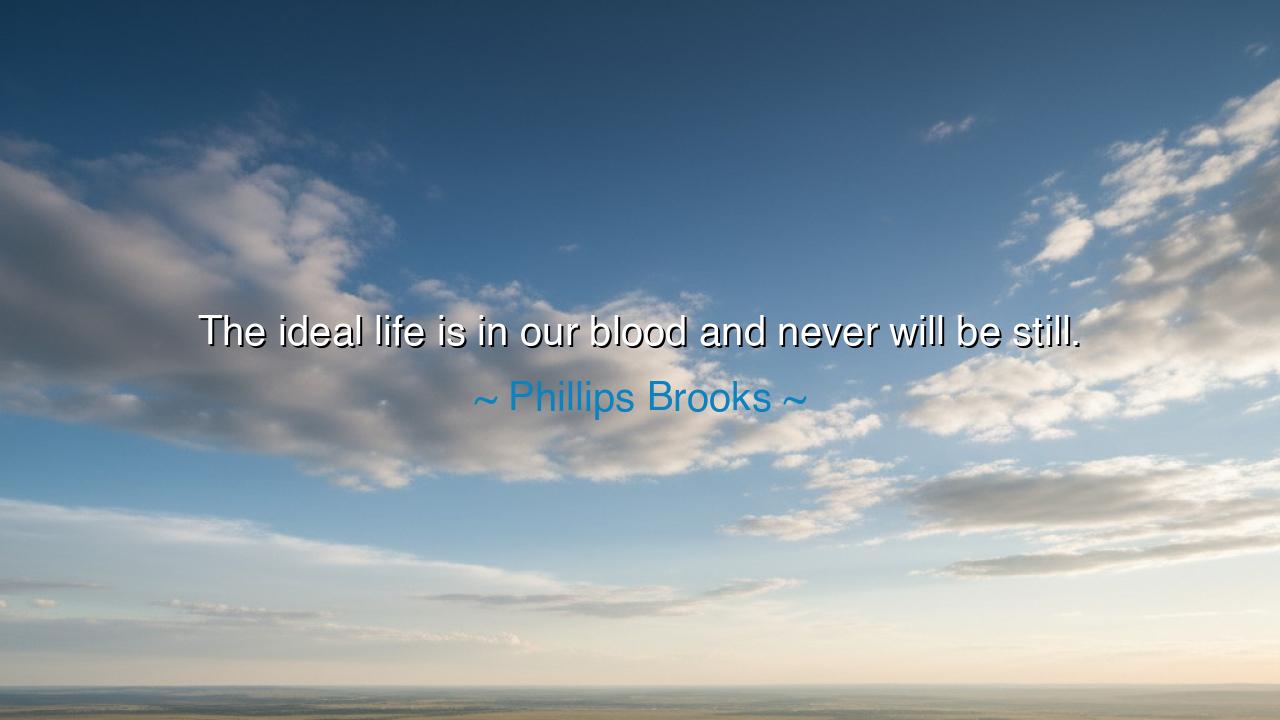
The ideal life is in our blood and never will be still.






“The ideal life is in our blood and never will be still.”
So wrote Phillips Brooks, the preacher of strength and serenity, whose words echoed with the pulse of eternal striving. In this single line, he unveiled a truth that burns through the ages: that within every human heart there beats a divine restlessness — a hunger for the ideal, a sacred longing for something higher, purer, and more perfect than what the world can give. It is not contentment that defines the human spirit, but the ceaseless motion of the soul toward light. The ideal life is not a destination; it is a flame that forever stirs within us, urging us onward.
Brooks, who lived in the tumult of nineteenth-century America — an age of war, revival, and rebirth — knew well the ache of such restlessness. He was a man of faith, yet no stranger to doubt; a shepherd of souls who understood that peace comes not from stillness, but from movement in harmony with purpose. When he said the ideal life is in our blood, he spoke of that sacred force that drives men and women to rise after every fall, to rebuild after every ruin, to seek truth though the path be thorny. It is life’s divine rhythm — the heartbeat of progress, of hope, of creation itself.
From the dawn of time, this inner stirring has moved humanity. It drove Moses to lead his people through the desert though he would never see the Promised Land. It moved Galileo to lift his eyes to the heavens though the world cursed his name. It sent Florence Nightingale into the camps of the dying, guided Gandhi through years of silence and struggle, and carried Nelson Mandela through decades of chains. Each felt within their veins that same burning — that ideal life that could not be still until justice, mercy, or truth had found a home in the world.
This fire within us is both blessing and burden. It gives us no rest, for it whispers always: You are not yet what you could be. It is the reason man builds cathedrals, paints the unseen, writes of heaven, and dreams of peace. The body may tire, but the spirit is restless still. Even when life grows quiet and our outward work is done, the ideal calls to us, bidding us grow in wisdom, gentleness, and grace. For it is in our very blood — in the sacred fabric of our humanity — that this yearning dwells. To deny it is to betray the image of the divine from which we are made.
Yet many seek to silence it. They drown it in pleasure, in power, in comfort; they call contentment the goal of life, and forget that contentment without growth is death. But the wise know that this divine unease is not our enemy. It is the voice of destiny, the gentle hand that pushes us from complacency toward greatness. When we feel the stirring of dissatisfaction, we should not despair — for it means the soul is alive. Brooks reminds us that to live ideally is to keep moving, to let the blood of aspiration flow strong and unceasing.
Learn, then, to listen to that rhythm within you. Let your ideal not be a dream forgotten, but a guide that shapes your every step. When the world tells you to settle, let your spirit whisper, No — there is more to be done, more to be learned, more to be loved. The ideal life is not perfection, but perseverance — the quiet, noble work of growing, serving, and believing in something larger than oneself. For as long as your heart beats, your purpose must live and move with it.
So remember, children of time: never let your soul grow still. Let your actions be the outward flow of that inner fire. Strive daily — not in haste, but in harmony. Build, create, forgive, and rise again. For the ideal life that Brooks spoke of is not found in temples or thrones, but in the spirit that dares to reach higher, again and again. As long as that divine restlessness lives in your blood, life will not be in vain — for you will walk, as all the great before you did, ever onward toward the light.






AAdministratorAdministrator
Welcome, honored guests. Please leave a comment, we will respond soon